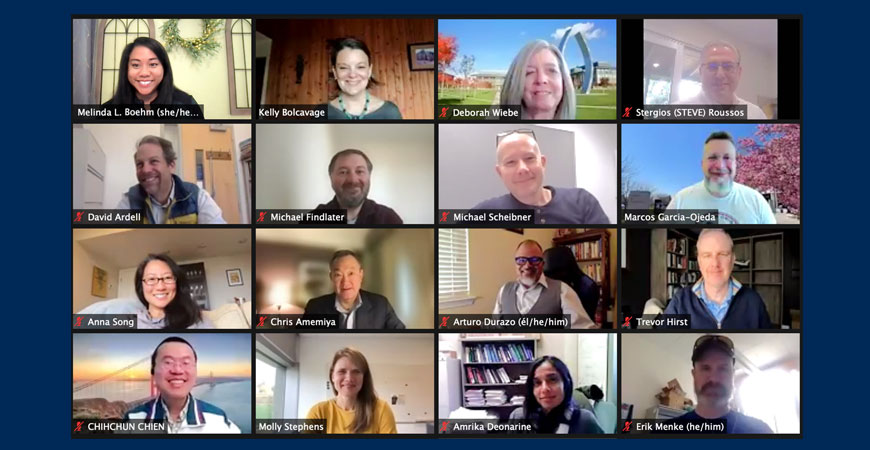
It’s one thing to push the frontiers of discovery through research into complex subjects. It’s quite another to align your work with the funding priorities of numerous federal programs, especially when seeking center-level funding to continue that research.
Enter UC Merced’s Office of Research and Economic Development, along with university deans and Organized Research Unit (ORU) directors.
This past fall marked the fourth Faculty Success Initiative-Extramural Funding Fellowship (FSI-EFF) program and the first curated for senior faculty members. Subject matter experts instructed fellows from several departments in strategies to present their work to wider audiences, develop interdisciplinary proposal teams and successfully manage large teams in a way that will make the research products stronger. The broader goal of the program is to grow the university’s research enterprise and, by extension, expand knowledge beneficial to the San Joaquin Valley and beyond.
The early idea for the program began with Dean Jeffrey Gilger of the School of Social Sciences, Humanities and Arts.
“From there, Research Development has taken the lead on planning the FSIs, but we do so in very close partnership with (interim Vice Chancellor for Research and Economic Development) Marjorie Zatz, the school deans and ORU directors. It really is a team effort,” Director of Research Development Melinda Boehm said.
The FSI-EFF program debuted in early 2020 with an in-person cohort of early and mid-level career faculty breaking into grant writing. A second workshop was held in early 2021 for early career faculty, and a third, in May 2021, helped mid-career faculty seeking funding from the NIH.
“Writing up your research for publication is hard enough but writing a compelling story about what you plan to do, how it adds to scientific discovery, how you will address problems that might emerge and its broader societal impacts can be quite challenging,” Zatz said. “The FSI program helps faculty, and especially early career faculty, make the case for their research so funders say, ‘This is a no brainer — it must be supported.’”
Because of the COVID-19 pandemic, the fall 2021 program was presented virtually. Experts from the National Institutes of Health (NCI), Elsevier, Academic Research Funding Strategies, LLC, and Divergent Sciences led with once-a-week modules over five weeks in October and November for senior faculty fellows.
“For this fall 2021 training, special thanks to Kelly Bolcavage for vetting the facilitators and strategizing how the modules would best support the granting needs of our senior faculty. She did a phenomenal job,” Boehm said.
Fellows in the 2021 program included:
- Professor Chris Amemiya, molecular and cellular biology
- Professor Chih-Chun Chien, physics
- Professor Robin DeLugan, anthropology
- Professor Michael Findlater, chemistry
- Professor Marcos Garcia-Ojeda, molecular and cellular biology
- Professor Yanbao Ma, mechanical engineering
- Professor Erik Menke, chemistry
- Professor Clarissa Nobile, molecular and cellular biology
- Professor Michael Scheibner, physics
- Professor Anna Song, psychological sciences
- Professor Deborah Wiebe, psychological sciences
The next FSI-EFF training is scheduled to take place this month.



